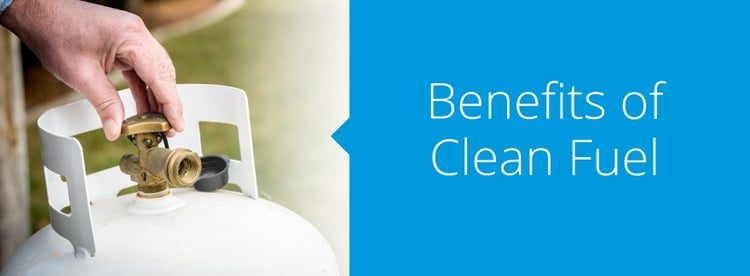
For homeowners, it is essential to understand what differentiates a clean fuel like propane from gasoline, oil and other types of fuel. With this information at their disposal, homeowners can make informed decisions about which type of fuel to buy.
At Smart Touch Energy, we want to do everything possible to educate homeowners about clean fuel and its benefits. So, let's take a closer look at clean fuel and why it is a great option for homeowners.
What Is Clean Fuel?
Clean fuel commonly refers to liquefied petroleum gas, a byproduct of natural gas processing and oil refining efforts. Propane was approved as a clean fuel in the 1990 Clean Air and is considered an alternative fuel under the Energy Policy Act of 1992. Unlike gasoline and oil, propane reduces carbon dioxide, a greenhouse gas, and air pollutants like carbon monoxide and nitrogen oxide.
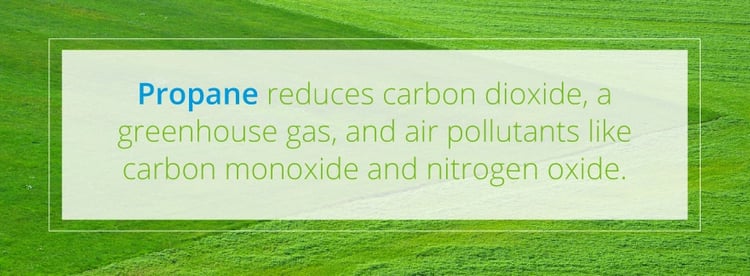
Propane can be separated from natural gas or oil wellhead gas at processing plants or extracted from crude oil during the refining cycle. Most often, propane is transported as a liquid under medium pressure or refrigeration. This ensures propane can be safely shipped and distributed, and it’s generally the most economical option for propane shipping and distribution as well.
If the pressure of propane is released or the temperature of propane is raised, propane becomes a flammable gas. At this point, propane is colorless and odorless. But an odorant may be added to a propane mixture to help people identify a propane leak or spill by smell.
What Makes a Fuel Clean?
What separates propane as a clean fuel is its environmentally friendliness. Propane is non-toxic and non-caustic, so it will not create an environmental hazard if it’s released into water or soil. Moreover, the long-term environmental effects associated with a large propane spill are minimal.
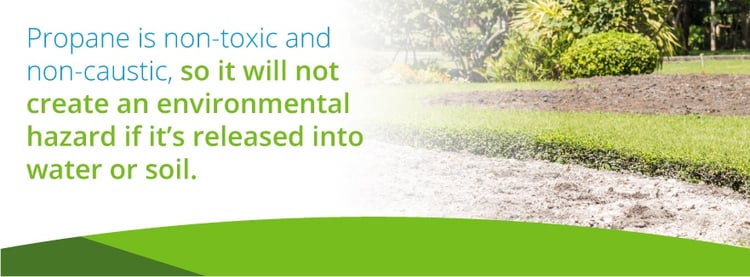
The only danger associated with propane relates to its flammability. If a propane leak or spill occurs, vapor could be ignited. If this does happen, there would be no long-term effects from ignited propane that could harm the environment.
Other factors that help propane stand out as a clean fuel include:
- Propane is not a greenhouse gas. A greenhouse gas will trap heat in the atmosphere, leading to warmer temperatures. Propane is not a greenhouse gas and does not contribute to greenhouse gas emissions in the environment.
- Propane will not affect freshwater or saltwater ecosystems. If propane leaks or spills into a freshwater or saltwater ecosystem, underwater plant and marine life would be unaffected.
- Propane is not harmful to soil or drinking water supplies. Propane liquid and vapor are environmentally sound. This means a propane leak or spill will not affect soil or drinking water supplies.
- Propane vapor is not a form of air pollution. Air pollution is a significant issue in many cities and towns. Conversely, propane vapor will not cause air pollution.
- Propane vapor is not harmful if it is accidentally ingested. In the event that propane vapor is accidentally ingested by animals, birds or people, it will not cause any harm.
The only time propane can cause harm is if liquid propane comes in contact with the skin. This situation is incredibly rare, as liquid propane has a boiling point of approximately -44°F (-42°C).
Is Propane a Clean Fuel?
As a homeowner, it’s paramount to choose a top-notch fuel. With propane, you can enjoy a clean, high-quality fuel that is both unique and effective.
Propane stands out from other types of fuel for many reasons, including:
- It’s clean-burning and high-energy. Propane offers an effective substitute to gasoline and oil. It has even been used to power many light-, medium- and heavy-duty vehicles.
- It boasts a high-octane rating. Propane has a high-octane rating that makes the clean fuel an excellent choice for spark-ignite internal combustion engines.
- It does not threaten the environment. Propane has been shown to pose no threat to groundwater, soil and surface water.
- It’s becoming exceedingly popular across the United States. According to the Alternative Fuels Data Center (AFDC), propane accounts for 2% of the energy consumed in the United States. And as homeowners search for cost-effective and clean fuel, the demand for propane may continue to increase.
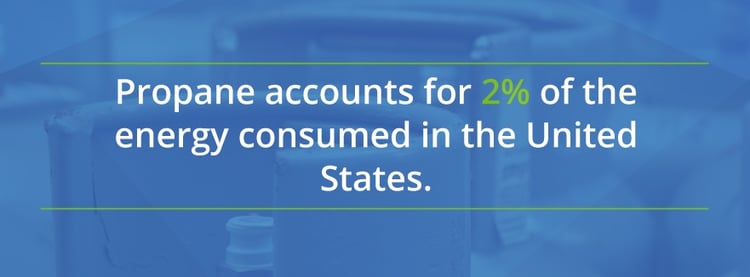
- It has a limited range of flammability. For propane to ignite, there must be a propane-air mixture present that contains between 2.2% and 9.6% propane vapor. In situations where the propane-air mix is under 2.2%, propane is too lean to burn. Or, in situations where the propane-air combination exceeds 9.6%, propane becomes too rich to burn.
- It won't ignite until it is combined with air and reaches a specific temperature. Propane won't ignite with air until it reaches at least 940°F (504°C). Comparatively, gasoline will ignite when the source of the ignition falls between 430°F (221°C) and 500°F (260°C).
- As a liquid, it will vaporize and dissipate. If a liquid propane leak or spill occurs, there is no need to worry. As a liquid, propane will vaporize and dissipate in the air.
- It’s easy to transport. Propane is much more economical as a liquid than a gas, and it is easy to store and transport propane as a liquid. Plus, propane can be used in areas that extend beyond gas mains.
Furthermore, propane is used in many residential applications, such as: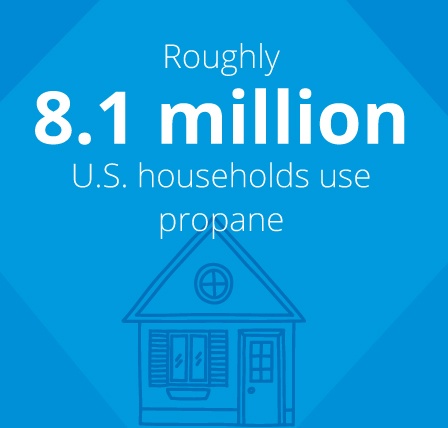
- Home heating: Roughly 8.1 million U.S. households use propane, and 4.6% of these homes use propane as their primary heating source. Propane home heating systems have been shown to help homeowners reduce their annual energy costs because they provide higher temperatures and a consistent flow of warm air, particularly when compared to electric heat pumps.
- Fireplaces: In many houses, a fireplace offers a great option to heat a residence in combination with a home heating system. Many fireplaces are powered by propane, and these fireplaces usually are easy to clean and maintain.
- Water heating: Propane water heaters often use less energy than electric water heaters. As a result, propane water heaters may help homeowners cut their water heating costs over an extended period of time.
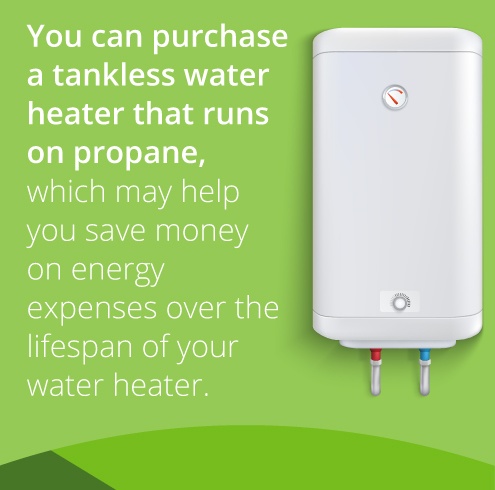 Tankless water heating: Propane tankless water heaters ensure you'll never run out of hot water, and they require limited maintenance. Also, you can purchase a tankless water heater that runs on propane, which may help you save money on energy expenses over the lifespan of your water heater.
Tankless water heating: Propane tankless water heaters ensure you'll never run out of hot water, and they require limited maintenance. Also, you can purchase a tankless water heater that runs on propane, which may help you save money on energy expenses over the lifespan of your water heater.- Pool and spa heating: Millions of homeowners use propane for pool and spa heating. With propane, homeowners typically can heat swimming pools, spas, hot tubs and saunas quickly and effortlessly.
- Appliances: Propane appliances represent safe, efficient options for many homeowners. Plus, homeowners can choose from a wide range of propane appliances, including refrigerators, clothes dryers and ovens.
- Boilers: A propane boiler will produce fewer emissions than a petroleum-based model. It will enable you to cut down on your energy costs without having to sacrifice energy output, too. Perhaps best of all, a propane boiler usually requires less maintenance than other types of boilers.
- Lawn care: Propane lawn mowers, leaf blowers and trimmers make it simple for homeowners to keep their lawns looking great. They also provide homeowners with lower fuel emissions and costs and improved performance in contrast to gas options.
- Grills: Propane is used to power the majority of grills sold in the United States. It can even be utilized to power a mobile home, along with RV appliances and generators.
- Transportation fuel: Less than 2% of all propane utilized in the United States is used for transportation fuel.
Clearly, propane plays a major role in millions of houses in the United States. It is a clean fuel that empowers homeowners — something that appears likely to continue in the foreseeable future.
Benefits of Clean Fuels
There are many benefits available to homeowners who select propane over gasoline and oil, including:
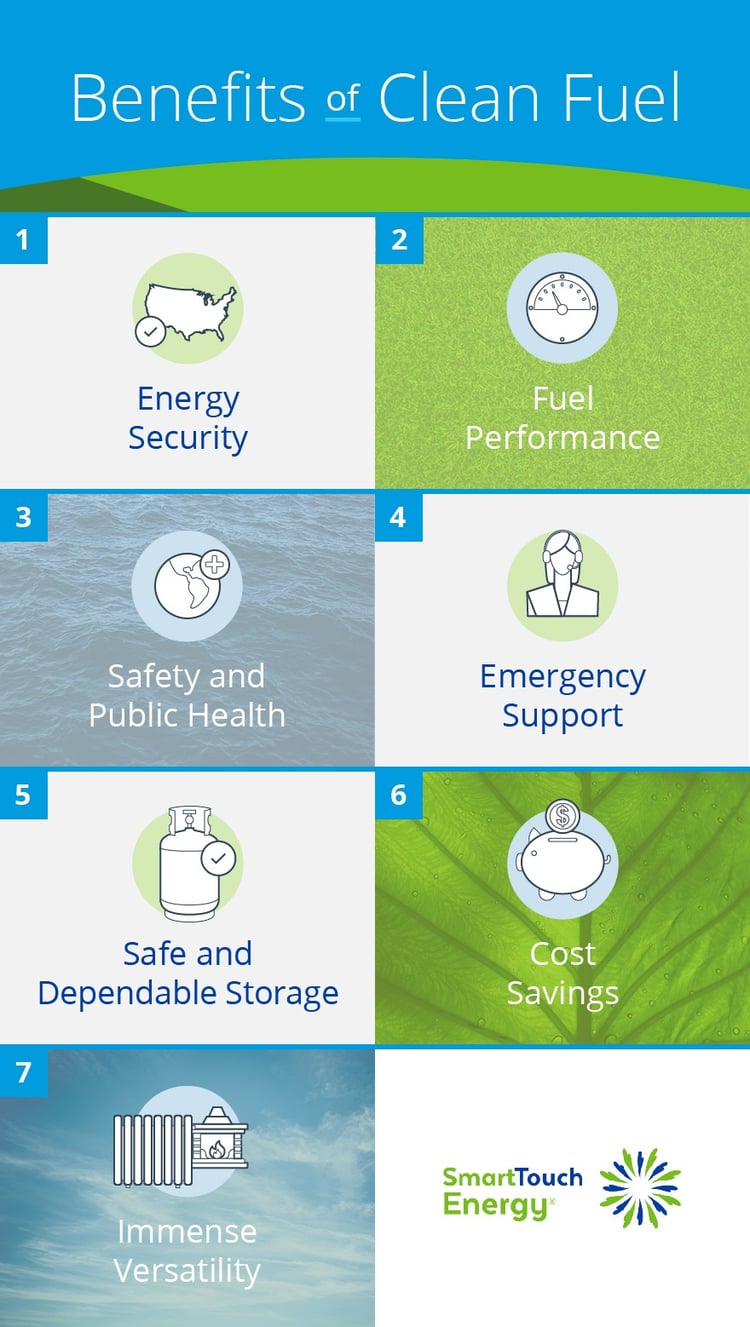

This work is licensed under a Creative Commons Attribution-NoDerivs 3.0 United States License.
- Energy Security
Propane serves as a domestically produced and proven clean fuel. It increases energy security in the United States and could play a vital role in the national economy for years to come.
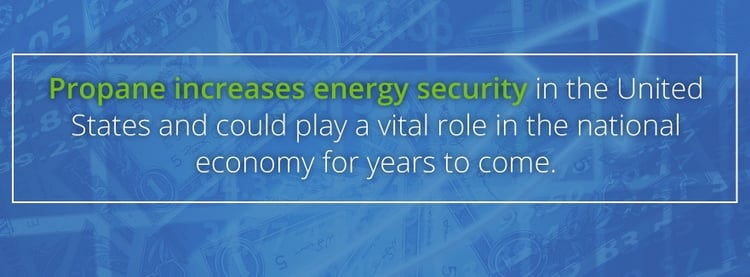
The AFDC points out the majority of propane used in the United States is produced domestically. It is distributed to homeowners nationwide via an established infrastructure and is used for many everyday applications.
As the worldwide petroleum supply dwindles, propane helps the United States become less susceptible to fuel supply disturbances. Going forward, the AFDC states the use of propane vehicles rather than conventional models could increase U.S. energy security too.
- Fuel Performance
In addition to serving as an environmentally friendly alternative to gasoline, propane provides homeowners with improved fuel economy and performance when compared to gas.
The AFDC indicates propane at main infrastructure sites is less expensive than gasoline per gallon.
Propane also delivers a similar range of driving to more conventional methods. Its octane rating is higher than that of gasoline. Plus, propane can deliver greater horsepower than gasoline.
Propane has an edge over gasoline in terms of fuel economy as well. The AFDC notes that even though propane has a lower Btu rating (British thermal unit) per gallon than gasoline, the cost of propane is usually lower than the price per gallon associated with gas. This means the cost savings provided by propane can help offset the difference in Btu rating per gallon between propane and gas, which commonly makes propane the more cost-effective and practical choice.
The low maintenance costs associated with propane have helped the clean fuel stand out in vehicles designed for higher mileage. Propane delivers a combination of a greater octane rating, lower oil-contamination and lower-carbon traits, providing better engine longevity in contrast to traditional gasoline engines. In propane-powered engines, the clean fuel mix of air and propane is entirely gaseous, which helps reduce the risk of cold air start problems commonly linked to liquid fuels.
- Safety and Public Health
Propane is among the cleanest-burning fossil fuels. It has been tested extensively by the EPA, which found that propane-powered vehicles produce significantly less carbon monoxide and fewer toxins and smog-producing emissions than gasoline engines.
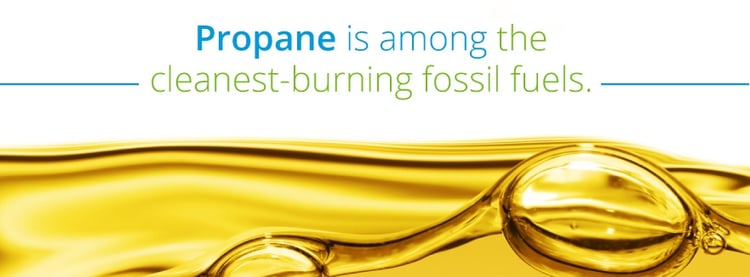
Also, propane has a low carbon content to ensure minimal emissions. And when propane is derived as a byproduct of natural gas production, it helps dramatically reduce petroleum use.
- Emergency Support
If a homeowner's electricity goes out, electric appliances will stop working. But for homeowners who invest in propane appliances, they likely can still use these devices even when electricity is unavailable.
Propane appliances only require a well-maintained and full propane tank to operate, and a typical propane tank can provide many hours of use. This means you should have no trouble using propane appliances, even during power outages.
- Safe, Dependable Storage
A home propane tank offers an outstanding fuel storage option. It is commonly more puncture resistant than tanks used for ethanol, gasoline and methanol.
In the event that a propane tank does puncture, you should be able to identify the problem immediately. Propane often includes an odorant that makes it easy to detect a propane leak or spill.
- Cost Savings
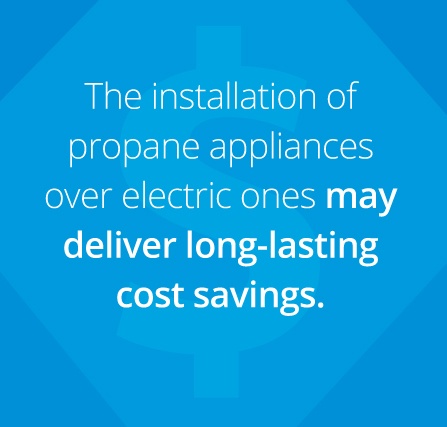 The installation of propane appliances over electric ones may deliver long-lasting cost savings. For example, heating your water or drying your clothes with propane will enable you to cut down on your energy bills.
The installation of propane appliances over electric ones may deliver long-lasting cost savings. For example, heating your water or drying your clothes with propane will enable you to cut down on your energy bills.
Many states offer clean fuel tax incentives as well. This means you may be able to enjoy extra cost savings thanks in part to various clean fuel tax credits.
- Immense Versatility
Propane has been shown to serve the needs of homeowners around the country. It can be used for home heating or a boiler. You may even consider a propane fireplace, which eliminates ash and soot produced by a traditional wood burning fireplace.
Other Types of Clean-Burning Fuels
Propane is one of many clean-burning fuels that has been shown to help homeowners. Other than propane, some of the most popular clean-burning fuels include:
- Ethanol: Serves as an alcohol-based alternative fuel. Ethanol is produced through the fermentation and distillation of corn, barley and other crops. In some cases, ethanol is blended with gasoline to boost octane levels and enhance emissions quality. Ethanol is becoming more popular because it can be produced via renewable materials. But ethanol subsidies also have been shown to have a negative impact on food prices and availability.
- Natural gas: Offers a widely available fuel. Natural gas is used in homes and businesses throughout the United States. Plus, many cars and trucks that run on natural gas have been shown to produce fewer harmful emissions than those that run on gasoline or diesel. However, natural gas also contains methane, a greenhouse gas that is a bigger contributor to global warming than carbon dioxide.
- Electricity: Provides a fuel source for battery-powered electric and fuel-cell vehicles. With battery-powered electric vehicles, the fuel source is stored in batteries. The batteries can be recharged by plugging a vehicle into a traditional power source.
Fuel-cell vehicles use electricity that is created via an electrochemical reaction that happens through the combination of hydrogen and oxygen. Electricity helps deliver highly efficient vehicles that create little to no combustion or pollution. On the other hand, electricity frequently comes from coal or natural gas, both of which can leave a big carbon footprint.
- Hydrogen: Can be paired with natural gas to create an alternative fuel. Hydrogen is being used in many internal combustion engines and fuel-cell vehicles. It doesn’t produce harmful emissions, but the costs associated with hydrogen fuel often can be overwhelming.
- Biodiesel: Represents an alternative fuel made from vegetable oils and animal fats, including those that have been recycled after restaurants use them to cook foods. Some vehicle engines recently have been converted to run on biodiesel, which burns in a pure form.
In addition, biodiesel has been blended with petroleum diesel for use in unmodified engines. With biodiesel, individuals can benefit from a safe, biodegradable fuel that minimizes air pollutants associated with vehicle emissions. But biodiesel is still a work in progress. There is limited production of biodiesel engines and a limited biodiesel distribution infrastructure currently in place.
- Methanol: Offers an alternative fuel in flexible fuel vehicles and can provide a source of hydrogen for fuel-cell vehicles. Methanol vehicles were designed to run on M85, a mixture of 85% methanol and 15% gasoline. However, automakers are no longer manufacturing methanol-powered vehicles.
There is no shortage of clean fuel options. But for the most part, none of the aforementioned clean fuel options can match the results propane provides.
Choose Smart Touch Energy to Handle Your Home Propane Needs
Propane is a clean fuel unlike any other, and many of today’s homeowners enjoy the benefits of propane.

When it comes to finding propane for your home, it is essential to work with a supplier that will go above and beyond the call of duty.
In fact, there are many questions to consider to ensure you can select the right residential propane supplier, including:
- Do you prioritize the customer experience? Ideally, a home propane supplier should allow you to take advantage of smart web tools that enable you to set up a unique energy profile and place orders online. This supplier also will empower its customers to manage their own propane accounts, track deliveries online and much more.
- Do you make it simple to get fast deliveries? After you place a home propane order, you should be able to get a delivery quickly. With a leading home propane supplier at your side, you’ll receive a propane delivery in a matter of days.
- Do you use a propane dealer network? In many instances, a home propane supplier may leverage a network of local propane dealers to ensure customers can receive orders on schedule. This supplier likely boasts an extensive propane dealer network, one that continues to grow to accommodate customer requests.
- Do you offer economical propane prices? For homeowners, it is important to review the average prices of propane from the U.S. Energy Information Administration (EIA). This data will give you a better idea about the average cost of propane in your state. Meanwhile, a top home propane supplier wants to provide propane at affordable prices. As a result, this supplier will offer propane prices at or below the EIA average.
- Do you respond to customer concerns and questions? A leading home propane supplier will do everything possible to reply to customer concerns and questions. This supplier wants customers to receive clean fuel without having to deal with a long, complex buying process. As such, a top home propane supplier will make it easy for customers to connect with expert team members over the phone or online.
Smart Touch Energy is here to take the hassle out of ordering propane for your home. Our mission is to provide an easy, customer-centric buying experience for every energy consumer in America. To accomplish our mission, we prioritize customer satisfaction and will go the extra mile to ensure you can purchase propane at the best prices.
To find out more about our propane services and how we can supply you with clean fuel, please contact us today at 855-385-7678.



